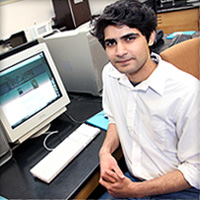 Computational physics and math major
Computational physics and math major
(New Delhi, India)
In a lot of ways, Sarvagya Sharma is just like any other guy at ACU. He hangs out with friends, eats at the Bean, plays computer games in his spare time. He has to study for tests and go to class just like everyone else. But in one way, he’s different from many of the students who surround him.
When he goes home for the holidays, he’s going halfway around the world.
Sarvagya grew up in New Delhi, India, with a love for science and a thirst for adventure. As a kid, he devoured science fiction; in high school, when faced with the choice of what subject to specialize in for his last two years, he picked physics.
“I’ve been interested in physics for as long as I can remember,” he said.
Fortunately, he had a good teacher, someone who challenged and inspired him. And although the learning style was more theory-oriented than hands-on application, he was still hooked.
“The teacher sparked an interest in me,” he said.
After he graduated high school, Sarvagya took a year off to wander around India, taking only a backpack and going wherever the mood took him. He traveled north, south, east and west, visiting city after city and even venturing outside the country. In Bangalore, he spent a few months studying art and architecture and examining his dream of someday becoming an architect.
Reputation for excellence
When it came time to choose a school, Sarvagya thought of his next-door neighbor, whose father taught at ACU years ago. The neighbor had told him about the university and, knowing that the physics department had an international reputation for academic excellence, Sarvagya decided to apply.
He’s glad he did. He likes the university as a whole and particularly his department. After years of theory-based learning, he enjoys getting to use what he’s learned in a lab setting. He’s impressed by his professors’ knowledge and their desire to see students learn.
“They really seem excited about what they’re doing,” he said.
Although Sarvagya chose ACU for its academic credentials, he’s interested in the atmosphere of faith that surrounds the university. He says there’s much more emphasis on religion here than in India, but that fact falls within the purview of his expectations.
“I knew it was going to be a spiritual place,” he said.
One of his favorite things about ACU is the people – they’re friendly, welcoming and open to new faces. He’s already made a group of good friends who share his interests. And the thing he misses most? Authentic Indian food, he says. There just isn’t any in Abilene – he has to drive to Dallas or Houston to satisfy the craving. He tries to go home every six months or so – with a home-cooked meal waiting for him at the other end of the journey.
Seeking energy solutions
Last summer, though, Sarvagya wasn’t home in India. He spent the break at Los Alamos National Laboratory, along with two other ACU students. They were all part of a project known as NIFFTE, which stands for Neutron Induced Fission Fragment Tracking Experiment. Around the world, nuclear reactors are not as safe or as efficient as they could be. NIFFTE seeks to find ways to make them more, he explained.
Sarvagya believes the project will help ordinary people become more comfortable with the idea of using nuclear energy. As global warming becomes a more urgent problem, he sees nuclear energy as the best alternative to current energy sources. More practical than solar or wind energy and already used for 20% of the United States’ energy needs, nuclear energy has the potential of completely revitalizing the way the world works. Even nuclear waste could cease to be a problem if it were appropriately recycled, he says.
When he wasn’t thinking about how to solve the world’s energy problems, Sarvagya spent time with his friends from ACU at their apartment in Los Alamos. He says the town was quiet, with little to do except watch movies and play computer games. They lived off of McDonald’s and Sonic and avoided the kitchen whenever possible.
Global researcher opportunities
The ACU students also met new friends at the lab, researchers who have been working on projects like this for years. There were researchers from all over the United States and others from foreign countries. Working on writing computer programming for the project, Sarvagya got to meet several of them and learn from their expertise. He’s already looking forward to going back this summer.
“It was a good learning experience,” he said.
At ACU, Sarvagya is involved with another sort of project, one known as Team55, which provides computer support services for the university. He has worked there for about a year. As a computational physics major, he is good at dealing with computers and their many problems. In fact, he’s thinking of getting a minor in computer science.
Sarvagya hasn’t decided what he wants to do with his degree once he graduates from ACU. He’ll probably go to graduate school, looking for a master’s or a doctorate in a physics-related field. He is interested in doing research. He’s also considering architecture or engineering, two of his other interests.
But whatever he chooses to do, Sarvagya knows that he’s got roots in a small city in West Texas, at a university where heart matters as much as brains and friends are waiting just around the corner. It’s a long way from home, but ultimately worth the journey. Or you could just sum it up in his own words.
“It’s a nice place.”
